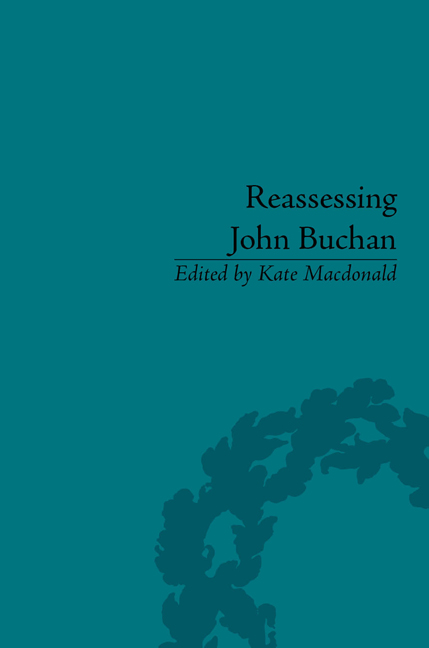Book contents
- Frontmatter
- CONTENTS
- List of contributors
- Introduction
- I Cultural Roots
- II Divided Loyalties
- 6 John Buchan and the South African War
- 7 John Buchan and the First World War: Fact into Fiction
- 8 Buchan and the Pacifists
- 9 John Buchan, America and the ‘British World’, 1904–40
- 10 Islam and the East in John Buchan's Novels
- 11 Conquistadors: Buchan's Businessmen
- III Literary Art
- Notes
- Works Cited
- Index
8 - Buchan and the Pacifists
from II - Divided Loyalties
- Frontmatter
- CONTENTS
- List of contributors
- Introduction
- I Cultural Roots
- II Divided Loyalties
- 6 John Buchan and the South African War
- 7 John Buchan and the First World War: Fact into Fiction
- 8 Buchan and the Pacifists
- 9 John Buchan, America and the ‘British World’, 1904–40
- 10 Islam and the East in John Buchan's Novels
- 11 Conquistadors: Buchan's Businessmen
- III Literary Art
- Notes
- Works Cited
- Index
Summary
A key moment in Mr Standfast (1919) is the death of Launcelot Wake, a conscientious objector and committed pacifist. Having belatedly signed up as a non-combatant, Wake's service in a Labour battalion and the Italian Red Cross pales in comparison to the gallant, patriotic and voluntary act that kills him: carrying a vital communiqué through enemy fire to prevent a German flanking move at the Battle of Amiens. Despite Wake's heroics, and the ravaging of his body, his devotion to pacifism stays unrepentantly intact: ‘Funny thing life. A year ago I was preaching peace … I'm still preaching it … I'm not sorry.’ By presenting pacifism in this way Buchan ensures that it retains an important otherness which would have been suppressed if he had made Wake shuck his principles for the aristo-military values against which he is defined. Wake contributes to the war effort but doesn't have to abandon his principles, a loyalty textually approved by Hannay's reading of events: ‘I had never had his troubles to face, but he had come clean through them, and reached a courage which was for ever beyond me’.
Mr Standfast marks a key shift in Buchan's views on pacifism. Before the First World War Buchan had been highly critical of anti-war sentiment, rejecting it in ‘Count Tolstoi [sic] and the Idealism of War’ (1904) as a threat to social pluralism and as fundamentally unrealistic as politics. His position gradually moderated, however, after the first Military Service Act, which legislated conscription for most men aged between eighteen and forty-one, was introduced in January 1916. By 1919, as we will see, Buchan could provide a more detailed critique of pacifism, and he was sympathetic to the sufferings of individual pacifists and pacifist groups that he felt had been victimized. Mr Standfast clearly states this refined perspective: with its descriptions of Biggleswick, Red Clydeside and Wake it highlights the diversity of pacifist politics and shows the numerous spaces that generate them.
- Type
- Chapter
- Information
- Reassessing John BuchanBeyond the Thirty Nine Steps, pp. 91 - 102Publisher: Pickering & ChattoFirst published in: 2014

